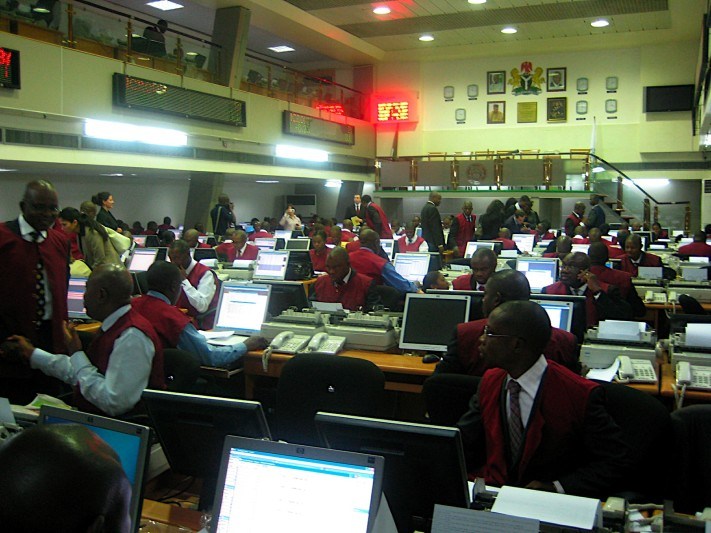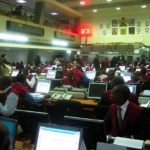By Chioma Obinagwam
The downward trend in the equities market which has lasted for 11 consecutive sessions and has began to send panic down the spines of most investors, analysts say, would continue if the Federal Government of Nigeria continues to pay lip service to the issue of insecurity and political uncertainty currently plaguing the country.
Charles Fakrogha, Analyst and Chief Relationship Officer at Foresight Securities and investment limited, an indigenous financial services and solutions firm with assets of over N9 billion, disclosed.
According to him: “The downward trend is not being unexpected. One, we have the political situation and the uncertainty towards the 2019 elections; that is what I call investors adversary- investors concern about what is happening in the economy. It’s as simple as that.”
“The government of the day needs to begin to create the enabling environment for foreign investors to invest in the country. The only way government can go about it is to ensure that all the political processes are transparent. Let people begin to see that the government is on top of whatever problem they have,” he argued.
A review of the weekly report of the Nigerian Stock Exchange (NSE) for the week ended June 1, 2018 showed that the NSE All-Share index slid further to 36,816.29 basis points(bps) even as the Market Capitalisation settled at N13.336 trillion, representing a 6.38 per cent decline each.
An All-Share index is a series of numbers which shows the changing average value of the share prices of all companies on a stock exchange, and which is used as a measure of how well a market is performing whereas Market capitalization is the market value of a company’s outstanding shares.
The report further indicated a decline in all the sectors of the Nigerian bourse.
Extracts from the report showed that the Industrial goods index shed 10.3 per cent making it the worst hit in the week, indicative of huge sell-offs in the shares of Dangote Cement and West African Portland Company(WAPCO), followed by the Consumer index which shaved 8.5 per cent.
Others include the Banking index shedding 4.5 per cent in the week under review; the Oil & Gas Index followed, losing 2.3 per cent while the Insurance index marginally slid by 0.1 per cent.
Also, the NSE Premium index, the index that tracks the performance of elite group of issuers that meet the Exchange’s most stringent corporate governance and listing standards, also recorded a decline, shaving 6.03 per cent in the previous week to settle at 1,468.45 basis points.
Apart from the inclement political climate in the country, Fakrogha noted that the market dynamics is another key factor in the downbeat of the market.
Market dynamics are pricing signals that are created as a result of changing supply and demand levels in a given market.
“Like we always expect the market dynamics; prices go up and they come down depending on the dynamics of the economy. You know that the market reflects the macro-economy,” he added.
Moreover, some shareholders believe that until regulators begin to pay more attention to retail investors to the detriment of their foreign counterparts, the market will continue to experience volatility.
The Chairman of Progressive Shareholders Association of Nigeria, Boniface Okezie said: “It is because of the concentration of the regulators on so called foreign investors, which are portfolio investors are coming here and when the market gets wrong, they sell-off and dump it.”
“Then the retail investors are not taken into confidence, wielding back into the market, that was undue of the regulators. They’re neglected and when the foreign dump it, who cash in? It is the local, so, if the local are not encouraged to the advantage of the foreigners you can see where the problem is today?”
Expectations for the week:
As another trading session commences this week, investors are itching to know the fate of their investments in the capital market.
Although a rebound in the market is largely dependent on a shift in the current political climate, analysts believe that other factors could spur a somewhat rebound.
Fakrogha, who is also a reputable Stockbroker, stated that the market would begin to experience an upbeat as soon as price sensitive information, strong enough to swing the pendulum in the northward direction hits the market.
He anticipates some form of rally towards the end of the month (June, 2018) when quoted companies begin to release their second quarter(Q2) results, which is expected to give investors some form of direction on their investment decisions.
“Now, by the time the second quarter is almost through, when the result of Q2 numbers is coming out. Of course, we’re going to see some companies that are resilient and doing very well bringing good numbers and when these numbers are brought to the market, of course, prices will go up and we’ll see the market going up,” he stated.
On the other hand, analysts at Afrinvest Limited, an indigenous wealth advisory firm with a focus on West Africa, stated that technical analysis show that the market decline has reached its peak and is warming up for a rebound.
Technical analysis is a trading tool employed to evaluate securities and identify trading opportunities by analyzing statistics gathered from trading activity, such as price movement and volume.
“The sustained negative market performance mirrors the weak global sentiment towards emerging Market assets as well as poor domestic investor appetite for equities despite noticeable stable fundamentals and attractive low prices. Technical indicator, using the 14-day Relative Strength Index (RSI) of 10.8, shows that the market is significantly oversold and is definitely set for an impressive rebound,” analysts at Afrinvest said.
“This week, we anticipate that bargain hunting opportunities created by the successive weeks of losses would drive positive performance of equities,” they continued.







Leave a comment